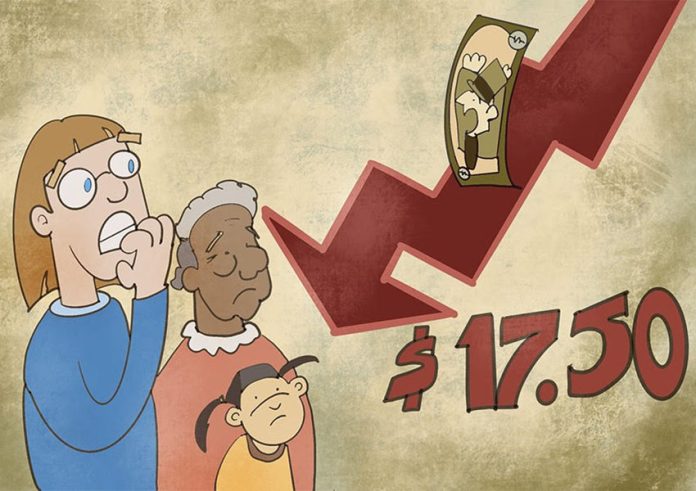I don’t know about you all, but this weakening dollar business is getting me all kinds of nervous: it was down close to 17.50 pesos as of earlier this week and could still be on its way down.
Things are getting tight.
Pair it with the inevitable march of AI ready to very soon render my marketable work skills (writing, editing, translating) worthless, and it’s a wonder I’m not in full-blown panic mode.
I mean, just give me a little time.
As much as people try to assure me that AI isn’t all that good and that people will “always value good work produced by real people,” the writing’s, quite literally, on the wall: AI is improving, and fast, and no company is going to say to itself, “Gee, I think paying people lots of money to do these things that machines could do for almost free and instantaneously is the better way to go.”
For now, I’m working while I still can and hoping that the future won’t be as grim for working people like me as it seems. The money I earn, meanwhile, is worth less and less with literally every day that goes by.
When I first thought about writing about this — “this” being rising prices, dropping dollar, precarious work situations — I felt downright contemptuous, the proverbial Barbie look-a-like complaining about being fat in front of all her “normal” friends. Few people in Mexico, after all, have much sympathy to muster up for someone earning in dollars, especially if they’re “working from home.”
But I’ve come to an important realization here: I’m not some lone privileged person in a sea of disadvantaged poor people. There’s actually quite a bit of money floating around, and a lot of that money comes from people earning about what I do north of the Rio Grande sending it back home.
I’m supporting my family on U.S. dollars in the same way many other families are being supported by U.S. dollars through remittances; I’m just doing so from here, fortuitously exempted by time and circumstance from having to do so from thousands of miles away. As the country’s “second-largest source of foreign revenue,” remittances help keep Mexico’s economy afloat in a major way… in 2022, to the tune of US $58.5 billion, to be exact.
What does that mean?
Well, first it means that workers, most in legally and economically precarious situations in the U.S., are supplementing employers in Mexico who don’t pay a living wage to their own workers by making up the difference: they fill in the gap between what employers in Mexico pay and what their workers need to live.
In a big way, they’re also supplementing government programs to the poor, who would have a much bigger crisis to deal with if it weren’t for those remittances. Heroes, indeed.
It also means that the weakening dollar is going to hurt a lot more people than just me and my fellow “digital nomads” — a group in which I do not, in fact, count myself; I “grew into” remote work while already here and am quite settled.
A lot of us, foreign and Mexican alike, are feeling the heat as prices continue to rise despite slowing inflation while our money suddenly becomes worth 10% less.
So while foreign companies gleefully come to “nearshore,” in large part attracted by the fact that they can pay such low wages, the reality is more nuanced than that.
While some services and housing, which takes up a big chunk of people’s income in the U.S. is indeed cheaper in many parts of Mexico, many goods in Mexico cost just as much or more than in the States. Food prices have gone up astronomically, and any kind of electronic products, cars or other items that might be considered “luxury” but are actually necessary for most people (think cell phones and computers, for example), cost the same or more. Gas is certainly more expensive.
And as a friend of mine recently pointed out, Henry Ford’s famous policy of making sure workers were paid enough to actually buy the products that they make seems to have been abandoned. Consider chains like Chili’s, Sears and a coming-soon Toys ‘R’ Us: while I haven’t seen any specific pay stubs, I very much doubt that workers are being paid what their U.S. counterparts are, even though the prices at these establishments are exactly the same.
In fact, it often feels like there are two distinct economies in Mexico: those who earn, perhaps, around what many middle-class U.S. families in the 1990s did, and those who seem stuck below the poverty line by perpetually suppressed wages and counting out their pesos for the day’s tortillas — the latter still a quite sizable portion of the Mexican population, one that reaches just above 50% in rural areas of many states.
Like I’ve said before, many of us — including Mexicans — are working in one economic reality (that of dollars) and buying in another. If I had a “regular job” here in my part of Mexico, my lifestyle would be about 10 times humbler.
Those U.S. dollars are keeping a lot of us afloat (for now) in an economy that is quickly becoming much less economical than its reputation.
But with a weakening dollar, the precarious situation of both remote contract workers like me and laborers in the U.S. sending remittances, the coming wave of AI technology ready to turn the entire world’s economy upside down and consistently rising prices, change is coming.
Let’s hope we can find a way to get all our heads above water.
Sarah DeVries is a writer and translator based in Xalapa, Veracruz. She can be reached through her website, sarahedevries.substack.com
